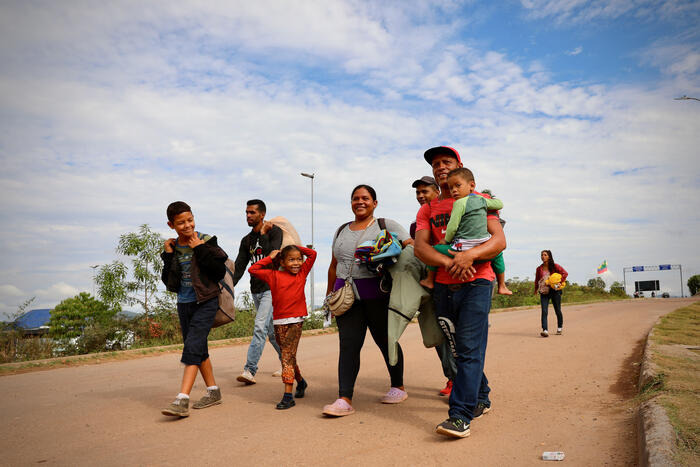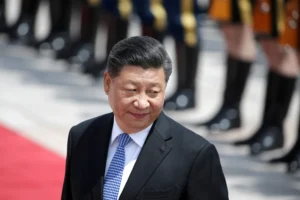Pacaraima, 3 April 2023 – Euclimar G., her husband Josfenix, and her two-year-old son Dylan hit a cross-border road at dawn, hoping to get a head start before the rise of the scorching heat of Brazil’s northern savannah. “Life in Venezuela became tough and we felt the need to come,” says 24-year-old Euclimar amid the noise, crowd, and queues at Pacaraima, a city in northern Brazil that lies just across the border from Venezuela and is the main entry point into Brazil for thousands of migrants.
At the end of their arduous and lengthy cross-border journeys, Euclimar and other Venezuelans are welcomed at the International Organization for Migration’s (IOM) Reception and Support Post (PRA) in Pacaraima. The PRA offers overnight accommodation, food, protection, and hygiene services for migrants and refugees who have just arrived in Brazil, as well as for the ones waiting for civil documentation and not staying in longer-term shelters.
Operação Acolhida, or Operation Welcome, is the humanitarian response and reception provided by the Brazilian Federal Government in Roraima, one of Brazil’s least developed and least populated states, in response to a historic influx of migrants and refugees arriving from Venezuela since 2017. It has been recognized as a model for the region.
More than 800,000 Venezuelans have crossed into Brazil through its northern border in recent years, seeking medical attention, food, and new opportunities.
Operation Welcome has three pillars: (1) Border Management, providing migrants and refugees with reception, identification, documentation, basic medical care, and immunization; (2) Accommodation in the border cities, including food, education, health and psychological care, and social protection and (3) Voluntary Relocation to other parts of Brazil where they have greater access to economic opportunities and integration.
Euclimar’s family is crossing the border for the second time. Despite an uncertain future and with no money in their pockets, they are hopeful for a renewed chance to rebuild their lives in Boa Vista, Roraima’s state capital. “We are doing it for my son, to provide him a better quality of life,” she says, lining up with hundreds of other Venezuelans newly arrived at the border.
At the end of the day in Pacaraima, a long line outside the PRA stretches past the fence and around the corner as 450 people come for a moment of rest. Every day, a bed, a shower, food, and psychosocial support are offered to migrants and refugees on the move.
Dianora L., 44, travels with her daughter with special needs, her two teenage sons, and her 60-year-old mother from Venezuela’s Bolivar state. The family is going to Brasilia to reunite with Dianora’s husband, the children’s father, who has been working there for five years. “It was challenging to leave my country, but I am very grateful to have the opportunity to come to Brazil and reunite with my husband,” she explains with teary eyes. “Above all, we are looking for a fresh start. And to provide a brighter future for our children.”
Under the baking afternoon sun, Daniel Q., 44, and his son Jordanis, 11, kill time playing dominoes at the PRA. Despite the pain of leaving loved ones behind, a sense of great hope moved them to migrate. Daniel wants to reunite with his older brother in Curitiba, southern Brazil, where a decent job awaits him. “We are going through a lot leaving our country, but it will all be worth it if I can give my son a better future and send money to the ones I left behind,” says the former fishmonger from Venezuela’s state.
Timely assistance makes a difference for hundreds arriving through the border daily, explains Priscila Leite, IOM field coordinator in Pacaraima. “IOM is working hand-in-hand with the Brazilian Government’s Operation Welcome, at all stages of the response, from arrival information points, medical and psychosocial support, overnight accommodation, and voluntary internal relocation. We have already helped tens of thousands of Venezuelans to rebuild their lives, with dignity, in Brazil.”
A “village of hope”
Jose R. and his son Pedro live in a shack in Vila Esperança, or the Village of Hope, a spontaneous settlement set up by Venezuelan migrants and refugees in Pacaraima. “At least now, a day of work allows us enough to eat and even send some money back home,” says Pedro as he cooks beans and rice for lunch. They arrived in Brazil five years ago.
More than 155 people live in this ramshackle shanty town in the border town of Pacaraima, putting huts together from recycled wood, scrap metal, and mud. In total, the city has 15 spontaneous settlements around the territory, where in the sense of community, the migrants and refugees acquire value by interacting and living more independently, making their own decisions. Nearly all Venezuelan residents in these places are unemployed and live off humanitarian assistance and government benefits. IOM regularly provides medical and phycological support and legal aid.
Regina L., a former teacher who left her job in Venezuela because her salary was insufficient, explains her plans for better conditions in the future. “What was my biggest dream?” she says. “To see my sons having a bright future; I hope my teenage daughter Laura will study dentistry.” Regina has opened a community centre for migrant children in the Village of Hope.
As they try to persevere, find hope and make new lives in their new surroundings, Venezuelans keep close tabs on the news from back home, mainly through WhatsApp messages and phone calls with those who stayed behind.
Jose R. left four children behind in Venezuela, and his greatest hope is to reunite with them and have them close to him soon. “We communicate by WhatsApp every day and I cannot wait to have them here with me,” he says with emotion, looking at the latest picture he received from them.
Source : ReliefWeb










